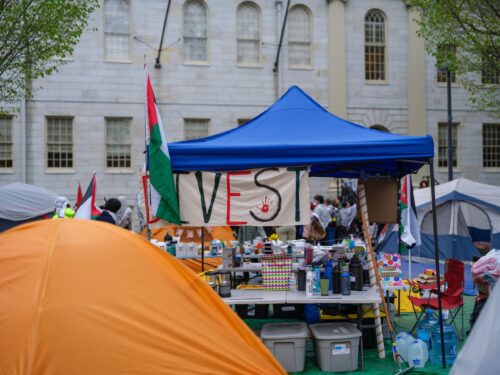Since Wednesday, April 24, the Harvard Out of Occupied Palestine Coalition (HOOP) has erected an encampment, consisting of around 40 tents, around University Hall in Harvard Yard. This encampment followed similar protests at Columbia and Yale. Many of these encampments have seen chaotic and violent scenes, with police called to disperse participants, leading to hundreds of student arrests. Any such characterization of the Harvard Yard encampment would be misleading. The HUPD Chief told The Crimson that as the encampment now stands, he sees no need for police intervention. Moreover, with days punctuated by a daily events schedule with teach-ins, music, and artistic sessions, the HOOP encampment has remained, for the most part, relatively jovial and tranquil.
The protestors are determined to remain in the Yard—despite impending finals and looming threats of disciplinary action—until Harvard discloses all of its Harvard’s financial investments and divests from all Israeli companies and companies with ties to Israel. However, while HOOP’s demands are relatively clear, implementing these demands is not as straightforward.
Part of this is the fault of Harvard. According to Lea Kayali, a third-year student at Harvard Law and protestor at the encampment, the most recent data the HOOP could obtain on Harvard’s investments was from 2020. “Now, a lot of those sources that we’ve received that information from [in the past] have been cut off to students, and there’s no more transparency about Harvard’s funding.” As a result, it is difficult for HOOP to outline clear steps from retracting financial ties to Israel without first getting Harvard to disclose all of its financial holdings.
Understanding the complexity of Harvard’s investments themselves has proven to be quite challenging. According to an article by HOOP in Mondoweiss, as of 2019, $86,000 of Harvard’s endowment was invested indirectly in the Israeli military, and $200 million was invested in “companies with ties to illegal Israeli settlements.” HOOP is basing this $200 million estimate on a 2020 Crimson article. The Crimson cited that the $194 million of this $200 million estimate arose from Harvard’s investment in Booking Holdings, a holding group of travel companies like Kayak and OpenTable, which list rental properties and bookings in the West Bank.
Moreover, a 2022 endowment report, which HOOP co-authored, cited the Centrares Holding Group as a case study of Harvard’s support for the “illegal occupation of Palestine.” The Certares Holding Group, in which Harvard invests over $70 million, holds part of Trip Advisor, a company that likewise lists properties in the West Bank.
When asked about the complexity of Harvard removing itself from holding companies, Kayali expressed certainty that Harvard could untangle themselves from these investments. “Harvard has purposefully created layers of obfuscation, but we know that they have an ability to find out what their investments are.” Violet Barron ’26, a protestor at the liberated zone, was likewise hopeful, pointing to Harvard’s successful divestment campaigns from Apartheid South Africa and the fossil fuel industry. “Divestment campaigns in the past have taken years and years,” Baron said. “It takes really big, visible disruptive actions like this one to push the needle and force Harvard to divest.”
Protesting students, however, are unperturbed by the possibly long, arduous, and uncertain path toward divestment. Barron said the encampment had “exceeded her expectations,” and she has seen “so much joy.” She continued, “People are really happy… I think the energy is spurred by the fact we all know this is a very historic thing we are doing and something that could have a real tangible impact.”
The joyous mood of the encampment belies the heavy disciplinary actions students may face from continued encampment in the Yard. On Saturday, Dean of Students Thomas Dunne, sent an email to the student body warning that the encampment was violating University policies by disrupting “normal activities of Harvard Yard” and that free speech must be conducted without “infringing on the rights of others.” The University also displayed a sign in the Yard, warning that “repeat violations of University and School policies will result in increasingly severe sanctions” and “students with pending disciplinary matters may not be granted a degree.” The sign, however, which has been draped with a Palestinian flag, did not seem to cause any concern to the protesters.
Barron said that all the protestors understand that “in undertaking this there is tangible disciplinary action. [Admin has] been doing intermittent sweeps and ID checks, and we all volunteered our IDs, we’re not trying to hide from admin.” Barron was ad-boarded in the fall for participating in an unsanctioned PSC protest, but she plans to remain despite the more severe penalties for students with repeated infractions.
And, although disclosure and divestment are HOOP’s primary demands, alongside the dropping of any charges against student protesters, some protestors are personally driven by a desire to show solidarity with college protests and movements throughout the nation. Barron, who is Jewish, was upset by the framing of encampments as antisemitic, and “feel[s] compelled to be here and very vocally dispel this narrative that all anti-Zionist and pro-Palestine rhetoric is inherently anti-semitic.” Although the Yard remains closed, many protestors are keenly aware of the global focus on Harvard and understand that their protest is being watched not only by Harvard admin but by the world at large.
Thus, regardless of Harvard’s immediate response to the encampment—whether they allow protestors to fulfill their promise of remaining in the Yard until divestment—protestors feel the disruptive, dramatic nature of this protest has permanently increased the urgency and altered the dialogue around Israeli divestment at Harvard.
Kate Kadyan ’26 (katekadyan@college.harvard.edu) writes News for the Independent.

